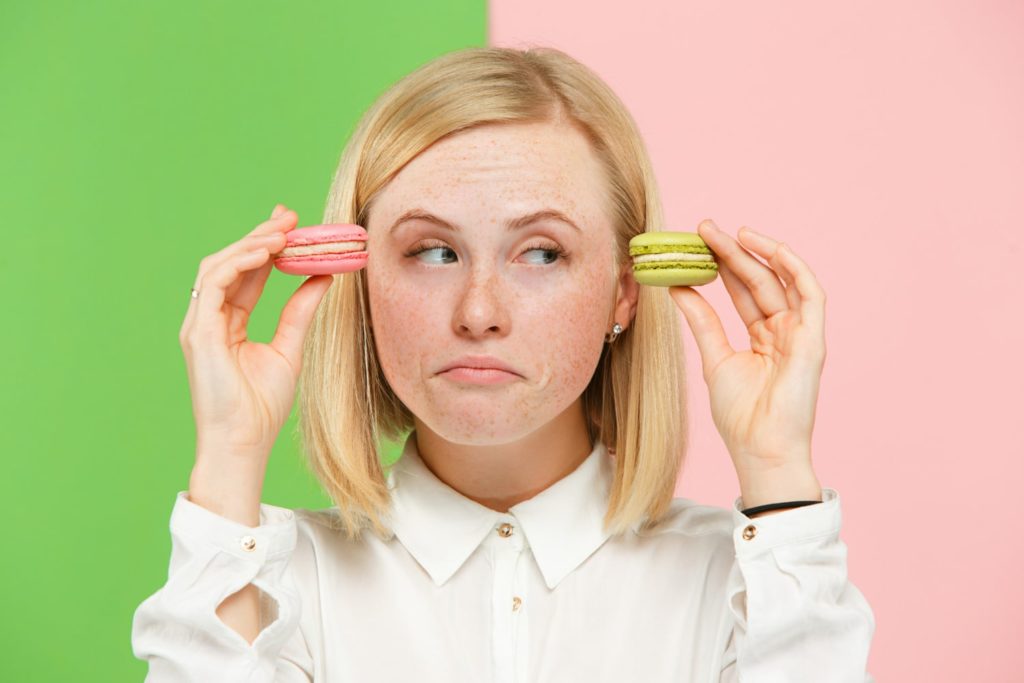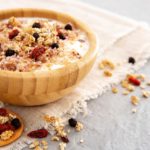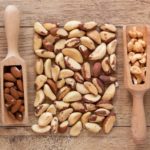
Tiana Hape-Cramond
(Associate Registered Nutritionist)
Note — The article was checked and updated September 2023.
Recommended daily intake of sugar (free form) is between 24g (women) to 36g (men). Average daily consumption of sugar in the Western World is between 60g (New Zealand 57g) to 100g (UK). This is the free form of sugar that doesn’t include our body converting other types of simple and complex carbohydrates into sugar/glucose.
Our brain needs approximately 25g of sugar to perform all of its functions, such as thinking, learning and memory recall.
We consume up to 4 times more which can lead to brain inflammation, brain cell damage and potentially brain cells dying due to the toxic environment that excess sugar can create in the blood.
To understand how sugar impacts our brain and creates addictive behaviour, we first need to understand the “difference” between carbohydrates and sugar.
Difference between carbohydrates and sugar
Carbohydrates are an important source of energy for the body. They can be divided into simple and complex carbohydrates.
The structure of carbohydrates includes; a carbon, hydrogen and oxygen molecules, and the length of these chains determines whether a carbohydrate is simple or complex.[1]
Sugar is an example of a simple carbohydrate which includes glucose and fructose. Glucose is found in the foods eaten such as candy and fructose is the sugar found in fruits.
Simple sugars are easier and faster to digest which allows for short bursts of energy.
Complex carbohydrates take longer to digest and can be used over a long period of time or stored for later.
Why does our brain need carbohydrates
The brain uses approximately 20% to 30% of the body’s energy consumption. Carbohydrates are the main provider of energy for the brain.
The brain prefers carbohydrates from whole foods, such as whole grain breads and cereals, rather than from simple sugars like white sugar.
Carbohydrates are important for fuelling the brain for optimum brain function and processes. If the glucose levels in the brain fall below a certain point, it can deteriorate the thought processes and cognitive functions.[2]
The brain might only weigh 1400 grams, but it uses up to 30% of the body's energy
When there is a low amount of glucose available, the brain can utilise ketones to provide the brain with energy. Ketones are a product of the liver created during the breakdown of fatty acids that can cross the blood-brain barrier.
Ketones can provide the brain with almost 60% of the energy needed, thereby replacing the need for glucose. Ketone concentration can be increased by diet, fasting or infusion.[3]
Effects of sugar on our brain
Sugar has many uses such as providing quick energy. But the consumption of sugar can have negative effects on the brain which include the inflammation of the brain, changes in chemistry of the brain, and can also decrease the quality of sleep.
Brain inflammation
Inflammation is the body’s immune response to the release of white blood cells that can cause swelling. The connection between sugar consumption and inflammation in the brain can be caused by sugar imbalances.
A fluctuation of blood glucose levels or continuous high blood glucose levels can activate the microglia, which is the brain’s immune cells. These immune cells activate the inflammation process which can cause the brain to function differently. The inflammation can cause slow transmissions in the brain, making thought processes slow and feeling foggy.[4]
Changes in the brain chemistry
The changes sugar creates in the chemistry of the brain is related to the reward system. A study on this connection involved feeding pigs 2 litres of sugar water every day over a twelve day period. This study found that after twelve days the pigs dopamine and opioid systems had changed when compared to the beginning of the study.
Importantly, the study found that the opioid system, which is responsible for wellbeing and pleasure, was activated with the first taste of the sugar water. This pleasure activity is thought to be responsible for the craving of sugar that is associated with food addiction.[5]
In the image below we can see the sugar-sensing neurons (pink) in the brain of a mouse, which were activated even when the scientists deleted the sweet taste receptors in the tongue.
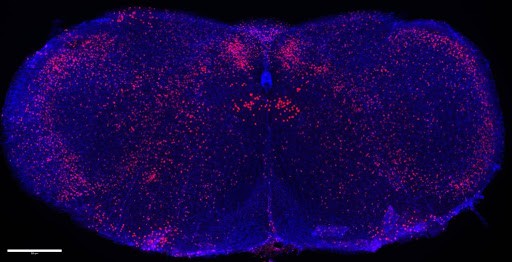
In other words, when sugar found its way to the gut, the brain reacted in the same way as if sugar had been tasted while dissolving in the mouth.
The quality of our sleep
The relationship between sleep quality and sugar is complex. With there being many behavioural factors that contribute to both sleep quality and high sugar consumption, it can be difficult to understand the effect fully.
RELATED — Different types of sleep: which one do we need the most
Lack of sleep can also affect food choice such as a preference for high fat and high carbohydrate rich foods.
RELATED — Diet and the Brain: Fats
A US study suggested that getting the recommended amount of sleep (roughly 8 hours for adults) may help resist the cravings for sugar sweetened beverages.[6]
A cross-sectional study found that there is a link between decreased sleep quality and the increased intake of sugar sweetened beverages in non-obese participants.[7]
Sugar and behaviour (our mental health)
With an increased consumption of sugar and sugar sweetened items it is important to understand some of the risks associated with sugar. Sugar consumption is linked to an increase in the risk of depression.
A study on the association of sugar sweetened beverages (SSB) and mental health found that 17.5% of participants who drank more than one SSB a day had poor mental health compared to those who did not consume SSB, and who had a prevalence of 10.2%.[8]
Suggested mechanisms include:
- Carbohydrate consumption increasing inflammatory markers that can depress mood
- High sugar consumption triggering hypoglycemia which can influence mood
- Addiction-like effects of sugar (that suggest dopaminergic neurotransmission mechanism) which has a link to depression.[9]
RELATED — Introduction to: Depression
Sugar addiction (modern epidemic)
Food addiction is a controversial topic that has sparked interest with researchers and manufacturers. Addiction to food is comparable to the use of drugs – the similar factors of this being the reinforcing effects of the release of dopamine due to the brain reward system.
Sugar addiction is the need and craving of sugar which interacts with the brain’s reward system to continue the consumption of sugar in order to release the dopamine that is produced.[10]
The allure of sugar is due to the palatability and pleasure experienced when eating sugary foods. Prolonged exposure to sugar can make people do anything to obtain sugar to create the positive response that sugar has on people.[11]
Addiction to food is comparable to addiction to drugs
The problem with sugar addiction is that manufacturers use these attractions of sugar to target and market their products towards children. Children who consume large amounts of sugar in childhood are more likely to continue this behaviour into adulthood and this can cause health illnesses.
Should sugar be regulated as a drug or a toxin?
There are heavy debates around whether sugar should be regulated. Robert Lustig, an endocrinologist, argues that sugar should be regulated as it leads to major health effects and has the same addictive and toxic qualities as drugs such as cocaine which meets the public health criteria for regulation.
However, this is disputed by the American Beverage Association and other researchers who reason that obesity and other illnesses that are associated with sugar consumption can also be caused by many other factors.
Consuming large amounts of sugar in childhood can continue into adulthood
More emerging research is coming out that supports Lustig’s argument for regulation of sugar. Adding a sugar tax to foods can be used to discourage high sugar consumption.
The issue around adding a consumer tax on sugar is making a clear definition of what is considered as an added sugar.[12]
Alternatives to Sugar (how to get off sugar)
With all these negative effects of high consumption of sugar, we need to find ways to switch out foods. When choosing an alternative to sugar, it is important to consider the reasons for cutting out sugar.
For those with diabetes, choosing an artificial sugar is better when used in moderation. Choosing natural sugars found in foods is a good alternative because these foods offer additional nutrients with the sweetness that is being craved for.[13]
RELATED – Diabetes: Early Signs, Causes, Types and Treatment
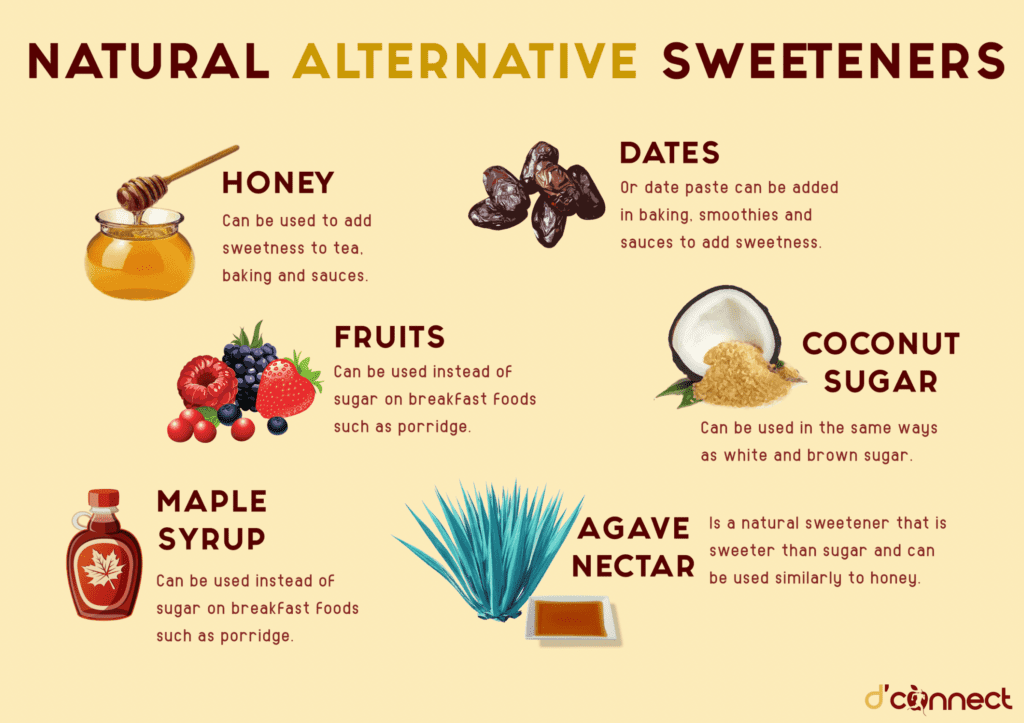
- Honey – Can be used to add sweetness to tea, baking and sauces.
- Maple Syrup – Can be used instead of sugar on breakfast foods such as porridge.
- Fruits – When craving for a sweet treat, fruit can be used as a snack option. Fruits low in sugar include: raspberries, lemons, watermelon and kiwifruit.
- Dates – Or date paste can be added in baking, smoothies and sauces to add sweetness.
- Coconut sugar – Can be used in the same ways as white and brown sugar.
- Agave nectar – Is a natural sweetener that is sweeter than sugar and can be used similarly to honey.
We also need to be aware of hidden sugars in our food. At the moment, there are over 60 different names and types of sugar.
Artificial sweeteners
RELATED — Artificial Sweeteners: Are they and Healthy Substitute to Sugar
Acesulfame Potassium
This sweetener can be added at the table as well as in cooking and baking. Acesulfame potassium has been used in candy, desserts and beverages.
Splenda
This artificial sweetener is 600 times sweeter than sugar, therefore, only a small amount is needed to enhance the flavour of foods. Splenda, also known as sucralose, can be added to baking and beverages.
Stevia
This sweetener is a natural sweetener from the plant Stevia rebaudiana. It is highly processed and approximately 300 times sweeter than sugar and can have a bitter aftertaste.
Tagatose
Tagatose is a type of fructose sweetener and is 90 times sweeter than sugar. This sweetener has been an area of interest for the connection with type 2 diabetes management.[14]
Top tips for cutting down on sugar
Cutting down on sugar can be difficult and going cold turkey from sugar can have negative side effects. Therefore, slowly cutting out sugar by swapping for foods low in sugar and sugar free can be a way to ease into an added sugar free diet.
1. Choose water as beverage of choice or beverages low in sugar.
2. When drinking fruit juice, ensure that it is 100% fruit juice and dilute with water to lower the amount of sugar consumed.
3. Choose whole fruits instead of processed desserts.
4. Snack on whole foods such as vegetables, fruits and crackers rather than processed foods with added sugar.
5. Add spices, vanilla or citrus to add flavour to foods.
RELATED — Water vs Sports Drinks
Related Questions
1. Can the brain use fat/ketones for fuel?
Although glucose is the main energy source for the brain, there are some instances where other fuel sources such as ketones can be utilized.
When people are on a low carb or ketogenic diet, the liver can convert glycogen into glucose and release it into the bloodstream to provide energy.
RELATED — Diet and Performance: High-Carb or Ketogenic Diet
2. How much sugar does the brain need daily?
Based on the type of diet, carbohydrates usually supply the body with 45 – 60% of the body’s total energy. A person of average weight is estimated to need 150 – 200g of glucose per day for function.
Two thirds of this glucose is allocated solely for brain function, which means that the brain needs anywhere from as low as 25g to 75g of sugar/glucose daily.[15]
3. Can sugar kill our brain cells?
Neurons and cells need glucose for energy and other functions. Hypoglycemia is thought to kill neurons in the brain by starving the cells of glucose. This usually occurs when glucose is below 1mM.[16]
Hyperglycemia on the other hand affects beta cells in the pancreas which can lead to insulin problems. Too much sugar in the blood can become toxic to the brain cells and it can either damage or kill them.
If you would like to know the effects of protein on the brain, we suggest you read Diet and the Brain – Proteins (cognition and brain performance).
Please share in the comments below what you think of the article and if we covered everything. Also, would you know how much sugar you usually have in your diet daily?
Tiana is an Associate Registered Nutritionist who has a passion for public health and education. Working towards a Master’s in Nutrition Practice with a Bachelor’s in Human Nutrition, Tiana has a personal interest in healthy heart nutrition and promoting positive lifestyle behaviours.
Tiana is a part of the Content Team that brings you the latest news here at D’Connect.
References
(1) Holesh, J. E., Aslam, S., & Martin, A. (2017). Physiology, Carbohydrates. https://www.ncbi.nlm.nih.gov/books/NBK459280/
(2) Kaniza Garari. (2017). Why carbohydrates are very important for the brain. Retrieved September 11, 2021, from Deccan Chronicle website: https://www.deccanchronicle.com/lifestyle/health-and-wellbeing/230417/why-carbohydrates-are-very-important-for-the-brain.html
(3) Jensen NJ, Wodschow HZ, Nilsson M, Rungby J. Effects of ketone bodies on brain metabolism and function in neurodegenerative diseases. International Journal of Molecular Sciences. 2020 Jan;21(22):8767. Available from: https://www.ncbi.nlm.nih.gov/pmc/articles/PMC7699472/
(4) Starr E. Brain Inflammation and Sugar: A Surprising Connection [Internet]. Team Health Care Clinic. 2018 [cited 2021 Sep 22]. Available from: https://teamhealthcareclinic.com/brain-inflammation-sugar-surprising-connection/
(5) Winterdahl M, Noer O, Orlowski D, Schacht AC, Jakobsen S, Alstrup AK, Gjedde A, Landau AM. Sucrose intake lowers μ-opioid and dopamine D2/3 receptor availability in porcine brain. Scientific reports. 2019 Nov 15;9(1):1-1. Available from: https://www.nature.com/articles/s41598-019-53430-9
(6) Prather, A. A., Leung, C. W., Adler, N. E., Ritchie, L., Laraia, B., & Epel, E. S. (2016). Short and sweet: associations between self-reported sleep duration and sugar-sweetened beverage consumption among adults in the United States. Sleep Health, 2(4), 272-276.
(7) Boozari, B., Saneei, P., & Safavi, S. M. (2021). Association between sleep duration and sleep quality with sugar and sugar-sweetened beverages intake among university students. Sleep and Breathing, 25(2), 649-656.
(8) Freije SL, Senter CC, Avery AD, Hawes SE, Jones-Smith JC. Association Between Consumption of Sugar-Sweetened Beverages and 100% Fruit Juice With Poor Mental Health Among US Adults in 11 US States and the District of Columbia. Preventing Chronic Disease. 2021 May 20;18:E51. Available from: https://www.cdc.gov/pcd/issues/2021/20_0574.htm
(9) Knüppel A, Shipley MJ, Llewellyn CH, Brunner EJ. Sugar intake from sweet food and beverages, common mental disorder and depression: prospective findings from the Whitehall II study. Scientific reports. 2017 Jul 27;7(1):1-0. Available from: https://www.nature.com/articles/s41598-017-05649-7
(10) Alonso-Alonso M, Woods SC, Pelchat M, Grigson PS, Stice E, Farooqi S, Khoo CS, Mattes RD, Beauchamp GK. Food reward system: current perspectives and future research needs. Nutrition reviews. 2015 May 1;73(5):296-307. Available from: https://academic.oup.com/nutritionreviews/article/73/5/296/1862679#28723033
(11) Hartney, E. How Addictive Is Sugar Really? [Internet]. Very Well Mind. 2020 [cited 2021 Sep 25]. Available from: https://www.verywellmind.com/sugar-addiction-22149
(12) Wanjek C. Sugar Should Be Regulated As Toxin, Researchers Say [Internet]. livescience.com. Live Science; 2012 [cited 2021 Sep 27]. Available from: https://www.livescience.com/18244-sugar-toxic-regulations.html
(13) Gaunt, A. 10 Healthier Sugar Alternatives to Try [Internet]. Aplaceformom.com. 2020 [cited 2021 Sep 27]. Available from: https://www.aplaceformom.com/caregiver-resources/articles/healthy-sugar-alternatives
(14) Fletcher J. What are the best sweeteners for people with diabetes? [Internet]. Medicalnewstoday.com. Medical News Today; 2019 [cited 2021 Sep 29]. Available from: https://www.medicalnewstoday.com/articles/323469#aspartame
(15) Glucose and The Brain: Improving Mental Performance [Internet]. Eufic.org. 2013 [cited 2021 Sep 23]. Available from: https://www.eufic.org/en/whats-in-food/article/glucose-and-mental-performance
(16) Auer, R.N. Hypoglycemic Brain Damage. Metab Brain Dis 19, 169–175 (2004).

